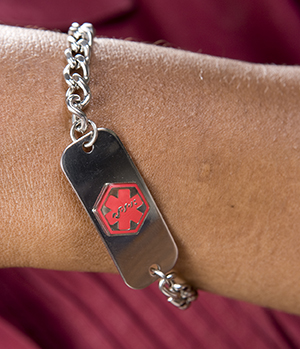Planning for Travel When You Have Diabetes
Taking care of your diabetes means having a routine for things like meals, exercise, and medicine. But sometimes this routine is disrupted when you travel. Before you travel, talk with your healthcare team. Tell them about your trip and the things you plan to do. Ask if there are any changes you need to make in your diabetes management while you're away. Your team can help you work out a plan to be ready. These tips can help.

When you travel
Here are some tips for safe travel:
Before you leave
-
If you need vaccines, get these a few weeks ahead. Then you can recover from any side effects.
-
Carry a letter from your healthcare provider. Ask them to include how your diabetes is treated (insulin shots, insulin pump, or pills). Have them list the type of insulin, syringes, and any other medicines or devices you use.
-
Bring a prescription for your insulin shots or pills. The prescription will help if you have a long delay or an emergency. Find the closest pharmacy where you're staying.
-
Pack double the medicine and supplies you think you'll need. Try not to put them all in 1 bag. It could get lost or damaged.
-
Tell the airline ahead of time that you have diabetes. They can have a healthy meal made for you. Or pack your own.
-
If you’re traveling across more than 2 time zones, ask your provider how to change your medicine or insulin schedule.
-
Wear a medical ID necklace or bracelet that says you have diabetes. This will help providers care for you if you can't tell them you have diabetes.
Daily care
-
Stick to your meal and exercise plans as much as you can.
-
Always carry a source of fast-acting sugar with you. This is in case you have low blood sugar (hypoglycemia). You might carry glucose tablets or hard candies. Don't use sugar-free candy.
-
Carry extra snacks in case meals are delayed. Bring crackers, cheese, or fruit.
-
Drink plenty of water. This is even more important when on a plane.
-
Wash your hands often with soap and clean, running water.
-
Check your blood sugar levels often. Changes in time zones, what you eat, and how much you exercise can cause blood sugar changes. Ask your provider how often to check your blood sugar while traveling.
-
On train, bus, or plane trips, take a walk in the aisle. Do this at least every 2 hours. This is to prevent blood clots.
-
Protect your feet. Never go barefoot. Be very careful on hot, sandy beaches. Or on hot pavement by pools. Do daily foot checks.
Your medicines and supplies
-
Keep all your diabetes supplies and medicines with you. Don't put them in your luggage. You can't always get to your checked bags. And your bags could also get lost.
-
Heat and cold may damage diabetes supplies and medicines. Don't leave them in places that get too hot or cold. This includes in direct sunlight, luggage compartments, and hot cars.
-
For plane trips, don't take off the prescription label from the insulin bottles and supplies. Transportation Security Administration (TSA) security agents may want to see these to let you carry them through security screening checkpoints.
-
Before going through body scanners or personal screenings, tell the TSA screeners if you're wearing an insulin pump. Or if you have a continuous glucose monitor (CGM). You should not have to remove an insulin pump or a CGM.
Be prepared
Tips to be prepared while traveling:
-
Keep a diabetes kit with all the supplies you may need. Include your blood glucose meter, batteries, test strips, and a lancing device. Also include fast-acting sugar, extra medicine, syringes if needed, and copies of prescriptions. Use a case made to carry diabetes supplies. Or use a makeup case, belt pouch, or briefcase.
-
Take your diabetes kit with you everywhere. Treat it just like you do your wallet and keys. Try to find a case for your insulin that's heat-resistant if you'll be visiting a warm place.
-
Carry important papers with you. This includes your health insurance cards, emergency phone numbers, and your healthcare provider’s phone number. If you're traveling with someone, give them copies as well.
-
If you're traveling with others, make sure they know how to help you. You may have problems with high or low blood sugar. They should know where you keep your diabetes supplies, medicine, and fast-acting sugar.
Online Medical Reviewer:
Chris Southard RN
Online Medical Reviewer:
Rajadurai Samnishanth Researcher
Online Medical Reviewer:
Rita Sather RN
Date Last Reviewed:
3/1/2024
© 2000-2024 The StayWell Company, LLC. All rights reserved. This information is not intended as a substitute for professional medical care. Always follow your healthcare professional's instructions.